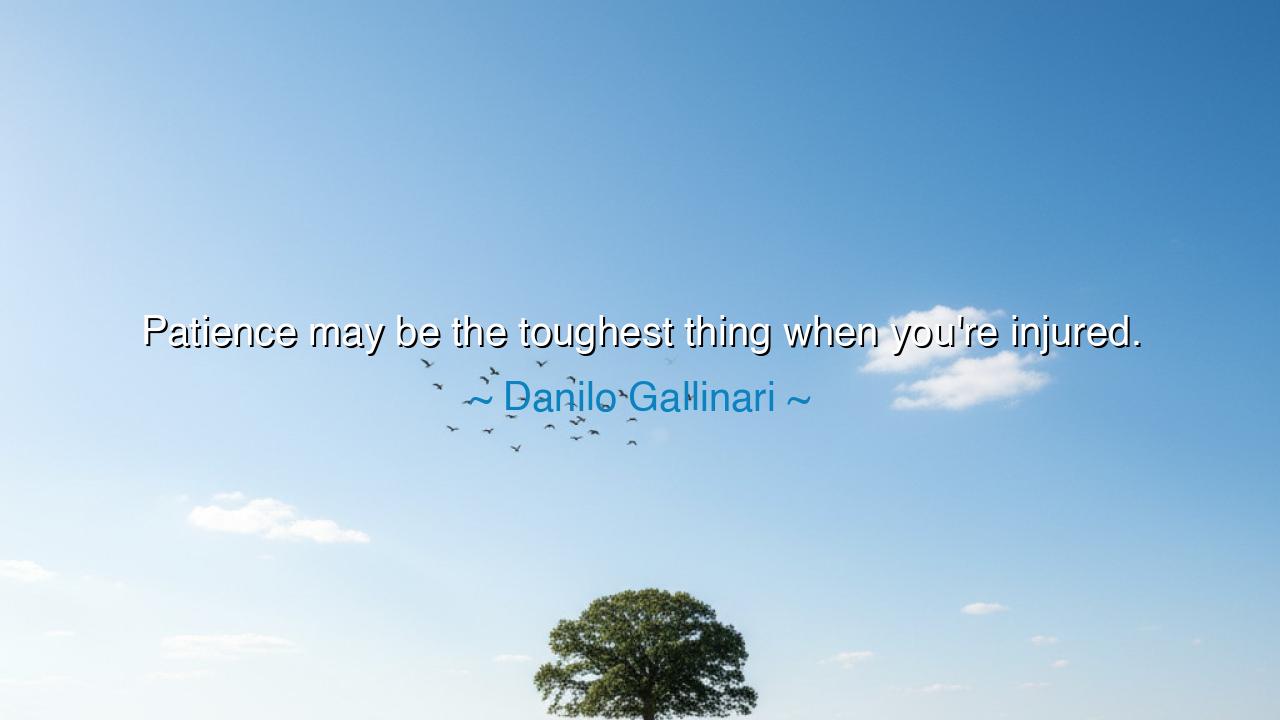
Patience may be the toughest thing when you're injured.






Hear the words of Danilo Gallinari, who has known the heights of competition and the depths of forced stillness: “Patience may be the toughest thing when you're injured.” These words, though born of sport, are etched with wisdom that speaks to every soul who has been halted on the path of striving. For injury is not only a wound of the flesh, but a trial of the spirit, a sudden reminder that strength is not unbroken and that time, not will, must be obeyed.
He names patience as the greatest challenge. For the warrior, the athlete, the laborer—action is life. To move, to fight, to create, to press forward is their natural breath. When injury strikes, it steals not only the body’s motion but the heart’s momentum. The soul cries, “I am ready!” but the body whispers, “Not yet.” It is in this chasm between desire and reality that impatience festers, and the true test of character begins.
History offers us a mirror in the tale of Achilles. The mighty warrior of the Greeks, nearly invincible, was brought low not by spear or sword, but by a single wound to his heel. Though his name echoes through the ages, his story reminds us that even the strongest are made vulnerable. In that vulnerability lies the demand for patience, a demand as difficult as any battle. For what hero enjoys waiting when the fight calls? Yet wisdom teaches that to rush before the wound is healed is to invite ruin, as countless athletes, soldiers, and dreamers have learned too late.
Consider also the journey of Franklin D. Roosevelt. Struck by polio, robbed of the easy use of his legs, he faced a lifetime bound by limitation. Yet he did not surrender to despair. Through patience, discipline, and endurance, he rose to lead a nation through its darkest hours. His injury, though cruel, became the forge of his resilience. Without patience, his spirit might have broken; with it, he grew into a leader who inspired millions. Thus Gallinari’s words echo a universal truth: patience in suffering can transform weakness into unseen strength.
The wisdom of the saying is not confined to physical wounds alone. For there are injuries of the heart, the mind, the spirit—losses, betrayals, failures—that leave us aching for swift restoration. In these, too, the hardest virtue is patience. We wish to leap ahead to healing, to skip the slow unfolding of recovery. Yet healing follows its own rhythm, and just as a bone cannot knit overnight, neither can the soul. To resist this truth is to deepen our suffering; to accept it is to grow.
Thus the lesson is clear: when you are struck down, do not mistake stillness for defeat. To wait is not to surrender. To endure the long days of recovery is itself an act of courage. The warrior who rests wisely lives to fight again, while the impatient who forces his return may find himself broken beyond repair. Patience, then, is not weakness but hidden strength, a discipline of the will stronger than any leap or strike.
Practical actions follow. When injured, whether in body or in spirit, accept the slowness of healing as part of your journey. Trust the process, follow the counsel of those who guide you, and resist the restless urge to hurry what cannot be hastened. Turn your focus inward: strengthen your mind, nurture gratitude, prepare for the day when you can rise again. In this way, patience becomes not your burden, but your teacher, shaping you into one who emerges from hardship not only restored, but transformed.






AAdministratorAdministrator
Welcome, honored guests. Please leave a comment, we will respond soon